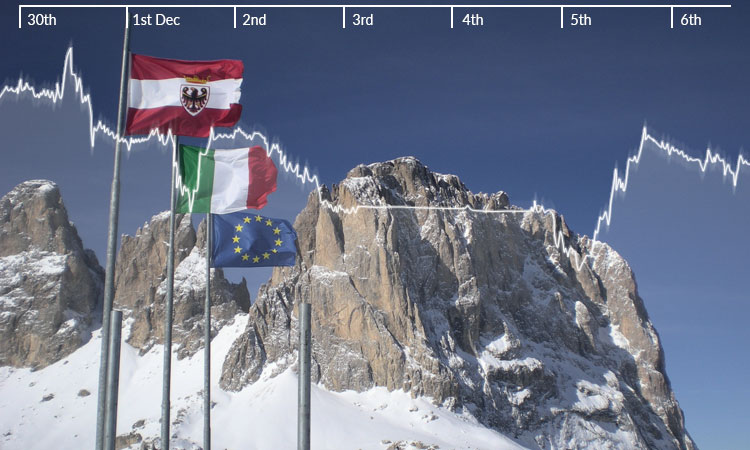
Getting over it
In the run-up to last weekend two specific political risks exercised investors. One was the run-off of Austria’s presidential election, where a crypto-green independent was facing a far-right Freedom Party candidate. The other was a referendum in Italy in which voters would be asked to say yay or nay to Prime Minister Matteo Renzi’s constitutional reform proposals.
When the results came out in the early hours of Monday it transpired that Austria had gone green and Italy had denied Sig. Renzi his reforms. Investors were fine with the Austrian result, less so with the one in Italy, especially after Matteo Renzi made good his promise to resign if defeated in the referendum. The euro took an early one-cent knock.
Then, just as it looked as though it could be in for more punishment, the euro turned higher. Having been on the ropes for no longer than an hour and a half it set off north to become the day’s strongest performer among the major currencies. Maybe it helped that Sig. Renzi was persuaded by the president to stay on until a new government could be formed. Perhaps the rejection of the reform proposals had been fully priced into the euro. Either way, what had threatened to be a major problem for the euro quickly became something of a non-event.
A softer Brexit?
After an almost complete whitewash the previous week sterling upped its game to become the top performer over the last seven days with an average gain of 2.2%. The change of heart coincided with a rather more emollient tone in Downing Street with regard to Brexit. Having previously pushed a “hard Brexit” agenda (leave the EU and leave the single market) ministers appeared to be giving more consideration to a “soft Brexit” (leave the EU but stay in the single market).
Investors still had nothing concrete with which to work but they became less anxious about the pound. On the week it added one and a half euro cents, two and a half Swiss cents and three and a half US cents. Its cumulative average loss since Brexit Eve was reduced to 11%.
On the fringes
Away from the mainstream there were developments for the Turkish lira and the South African rand. In Ankara President Erdogan called on citizens who hold savings in dollars or gold to convert them into lira in order to support the struggling currency. This will be a tough ask for folk who have avoided the lira’s -20% decline in the aftermath of July’s attempted coup by holding euros or dollars. Having watched the lira fall -3% in the last week alone they might struggle to see the benefits of buying it.
South Africa’s rand is lower on the week too, to the tune of -2%, but it could have been worse. There was every chance last Friday that Standard & Poor’s would lower the country’s credit rating from BBB- to BB+, demoting it from “investment grade” to “junk” status. In the event S&P made no such change and the rand perked up.
The good news
Friday’s US labour report showed another 178k new jobs being created in November, taking the rate of unemployment down to 4.6%, a nine-year low.
The bad news
Unfortunately American wages fell too, by -0.1%.
Sarah, Senior Account Manager at Moneycorp
Moneycorp is one of the largest international payment companies supporting over 90 currencies. Last year Moneycorp traded over £22.6 billion worth of international money transfers. Find out how Moneycorp can help you with your international transfer here.





